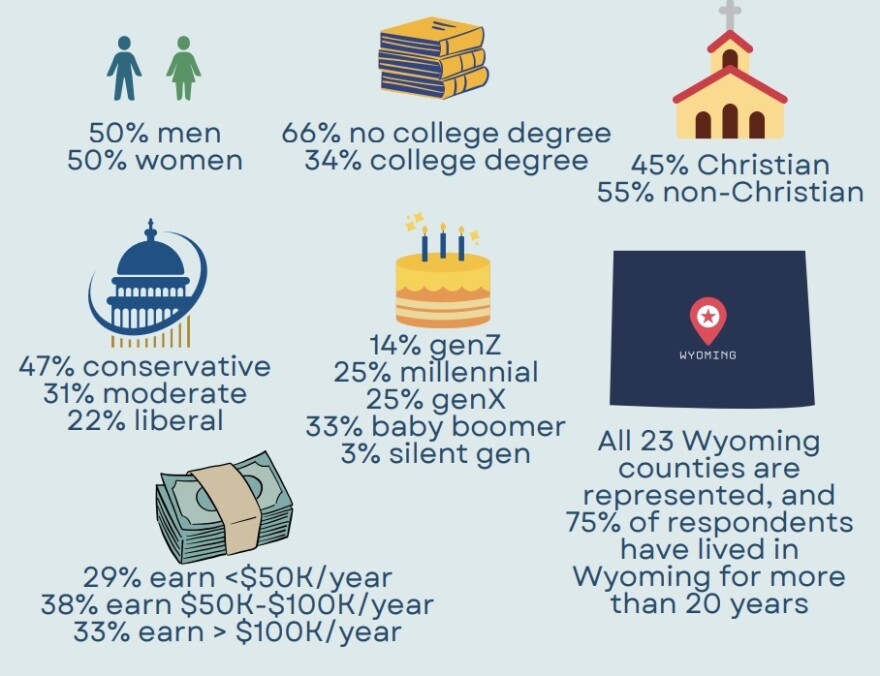A recent University of Wyoming survey of Wyomingites found about 86% believe climate change is happening. There’s lots of nuance wrapped up in that number, like differing thoughts on what’s causing these changes and just how bad they’ll be. But that large majority might be surprising if you’ve followed state politics, where some lawmakers have denied climate science.
Wyoming Public Radio’s Caitlin Tan interviewed Kristen Landreville, the lead researcher of the study, which looks at water, climate and Wyomingites.
Editor's Note: This story has been edited for clarity and brevity.
Caitlin Tan: Why should people trust these results or feel that they represent Wyoming?
Kristen Landreville: The survey is representative. What that means is that we have the same type of distribution in our sample in terms of demographics like age, every county is represented, as well as biological sex. So we have these demographic variables that reflect the Wyoming total population. So we can say that with our results, that these 500 people [survey respondents] can represent the entire state.

CT: Let's get into the meat of the study. It seems like where most Wyomingites had common ground about climate change is with water. The vast majority say the state is susceptible to changes in water resources. What does that mean?
KL: We know that weather and water really shape our daily experiences. What's interesting, though, is that they might see it as less of a now problem and more of a future problem.
We do see some differences slightly by region. For example, we know that the City of Rawlins has had some issues with water infrastructure, with drought. More people in that area said, ‘Yes, we're feeling the effects of these water changes,’ compared to people in the northwest part of the state, where they have more water resources in general.
CT: There wasn’t agreement on why climate change is happening. About half said they believe it's not human caused, and that's despite most research and scientists saying otherwise. Anything more you can share with those details for us?

KL: We do know that some of these issues with causal attribution could relate to trust – trust in who you see as your opinion leader, who you see as in your in-group. So it could be a difference in if they're trusting climate scientists more than they trust their lawmakers.
CT: What are the next steps? Based on the people that you surveyed, it seemed like the majority would like to see changes or some kind of action.
KL: I think that's one of the key results from the survey. About 75% of people want state lawmakers to do more to address the changing water resources in the state. People were supportive of a small financial incentive to homes that use less water, requiring K to 12 teachers to discuss water, and then another idea was to pay water rights holders in the state for more efficient water operations. Lots of people think that these costs are worth it. People recognize that these policies are going to cost money to implement.
I also want to talk about this idea of local community action, too. We found that again, 75% of people see water changes happening, but they said that only 30% of people in their community thought the same thing. When you get that gap, it can create this fear of not knowing what other people think. You think they disagree with you, so you're afraid to speak out, or you don't feel comfortable talking about these issues in your community.

CT: Stepping back to what you were talking about with people hoping to see policy changes. Do you think that's realistic based on who has been voted into office? Some of Wyoming's Freedom Caucus members, especially this session and the last, have touted a lot of climate change denial, [with] some saying we don't need to reduce climate warming emissions or attributing melting glaciers to reasons other than climate change. On a federal level, we are seeing climate change research disappear after President Trump took office. So is it actually realistic to see policy changes when quite a few lawmakers don't seem to believe in climate change at this point?
KL: Yeah, I think when people go into the voting booth, they're not necessarily voting on climate change issues. They could be voting on things like security or the economy, but that doesn't mean that they agree with who they elect 100% of the time. So I think it'd be a mistake of lawmakers to just assume that their people who voted for them think exactly the same with them on every single issue.
Anyone who has power in this government, we need to think about this survey and what it's showing us, what Wyoming people are saying. That there are changes going on, and they want to plan for them.

CT: It sounds like obviously this was really important research to you and your team. This was partly funded by the National Science Foundation (NSF), which has recently been on the chopping block by the Trump administration. NPR reports that hundreds of previously approved NSF grants aren't going through, and the agency could see billions in budget cuts. Do you have any concerns about research going forward?
KL: I do. I am concerned federal funding is not easily replaced. Having said that, I do think that there are opportunities for nonprofit groups, private foundations, corporations to step up, but I don't know if it could fill the potential federal funding gap that could occur.
CT: Would you guys have been able to do your research to the extent that you did without the NSF grant?
KL: Well, the National Science Foundation fully funded my work with the survey, so I don't think that this survey would have happened without the support.
To see the summary of survey results click here.
To see the interactive dashboard of survey results click here.









